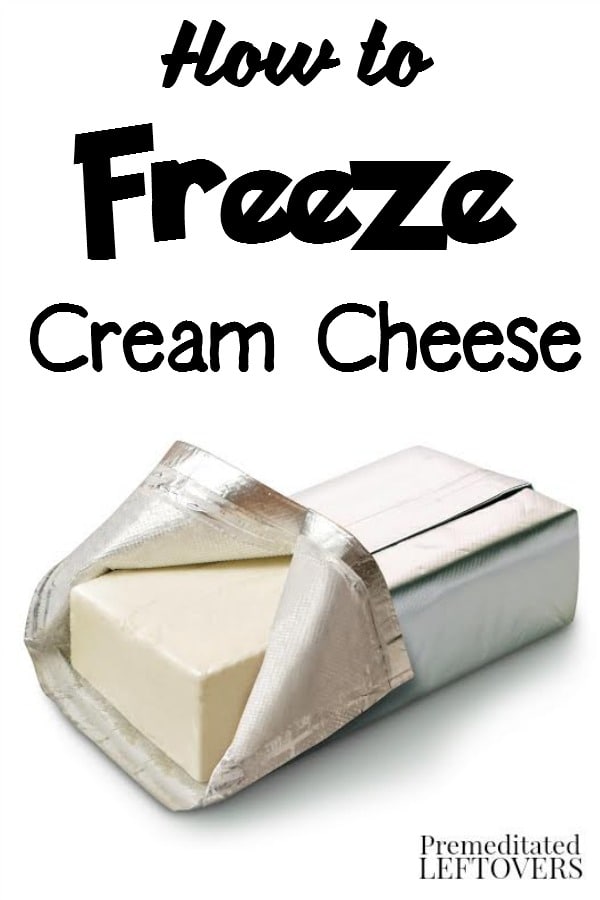Yes, you can freeze cream cheese for later use. Now let me give you the details.
Cream cheese is a versatile ingredient that adds richness to various dishes, but sometimes you may find yourself with extra cream cheese that you don’t want to waste. Freezing cream cheese is a simple and convenient way to extend its shelf life.
Whether you have an unopened package or leftover cream cheese, you can freeze it to use at a later time. By following the proper freezing and thawing methods, you can ensure that the cream cheese maintains its taste, texture, and quality. We will discuss how to freeze cream cheese effectively, including packaging methods and thawing instructions. So, read on to learn more about freezing cream cheese and how you can do it without any hassle.

Credit: insanelygoodrecipes.com
The Basics Of Freezing Cream Cheese
Yes, you can freeze cream cheese. It’s important to note that the texture may change slightly after freezing. When thawed, the cream cheese may become slightly crumbly or grainy. However, it’s still suitable for many recipes that require blending or cooking. Before freezing, consider the factors such as the original texture of the cream cheese and the specific recipe you plan to use it in after thawing. Additionally, ensure that the cream cheese is stored in an airtight container or wrapped well to prevent any freezer burn. Moreover, label the container with the date of freezing to track its freshness. When thawing, refrigerate the cream cheese overnight for the best results. In conclusion, freezing cream cheese is possible, but it’s important to consider these factors to maintain its quality.

Credit: premeditatedleftovers.com
Best Practices For Freezing Cream Cheese
When freezing cream cheese, it is important to follow the best practices to ensure its quality is preserved. Proper packaging is crucial for keeping the cream cheese fresh and free from freezer burn. To freeze cream cheese, tightly wrap it in plastic wrap or foil. Seal it in an airtight container or freezer bag to prevent moisture loss. Label the packaging with the date to keep track of its freshness.
When thawing frozen cream cheese, transfer it to the refrigerator and let it defrost slowly for several hours or overnight. Avoid using hot water or the microwave, as this can alter the texture and consistency of the cream cheese. After thawing, it is recommended to use the cream cheese within a few days for optimal taste and quality.
Recipes And Ideas For Using Frozen Cream Cheese
Wondering if you can freeze cream cheese? The answer is yes! Freezing cream cheese is a great way to extend its shelf life and ensure you always have some on hand. Whether you have leftover cream cheese or want to stock up when it’s on sale, freezing is a convenient option. To freeze cream cheese, simply place it in an airtight container or freezer-safe bag. Be sure to label it with the date and quantity for easy reference.
If you’re wondering how to incorporate frozen cream cheese into your recipes, we’ve got you covered. Thawed cream cheese works well in a variety of dishes, from creamy pasta sauces to delicious cheesecakes. It can also be used as a spread on bagels or toast. Get creative with your frozen cream cheese and experiment with different recipes to find the perfect dish.
Incorporating Frozen Cream Cheese in Cooking
Thawed cream cheese can be incorporated into cooking to add a creamy and flavorful touch to your dishes. Use it to make creamy dips, stuffed mushrooms, or stuffed chicken breast. It can also be added to soups and casseroles for an extra creamy texture. The possibilities are endless!
Creative Ways to Use Thawed Cream Cheese
Looking for some creative ways to use thawed cream cheese? Try making cream cheese frosting for your favorite cakes and cupcakes. You can also use it as a filling for pastries or as a delicious swirl in homemade ice cream. Don’t be afraid to get creative and experiment with new recipes!

Credit: www.thekitchenmagpie.com
Potential Issues And Solutions
When freezing cream cheese, it’s important to be mindful of potential changes in texture and consistency. Due to its high moisture content, cream cheese can become grainy or separated after thawing. To prevent this, ensure the cheese is well-protected from freezer burn by wrapping it tightly in plastic wrap or aluminum foil. Consider portioning it into smaller sizes for easier thawing and less frequent exposure to temperature changes. Additionally, using airtight containers can help maintain the creamy texture. It’s crucial to allow the cream cheese to thaw slowly in the refrigerator to minimize any adverse effects on its quality. By following these precautions, you can enjoy the versatility of cream cheese without compromising on its taste and texture.
Frequently Asked Questions Of Can You Freeze Cream Cheese
Is Cream Cheese Any Good After It Freezes?
Cream cheese may separate and become grainy after freezing, affecting its texture and consistency. It’s not ideal.
Why Does Cream Cheese Say Do Not Freeze?
Cream cheese says do not freeze because it can change the texture and consistency, leading to separation and a grainy texture.
What Is The Best Way To Freeze Cream Cheese?
For best results, portion the cream cheese into small pieces, wrap them tightly in plastic wrap, and place in a resealable freezer bag. Label with the date and freeze for up to 3 months. Thaw in the refrigerator before using.
Why Is My Cream Cheese Grainy After Freezing?
Cream cheese can become grainy after freezing due to changes in its texture. Freezing can cause the fats and liquids in the cheese to separate, resulting in a grainy or curdled consistency. To prevent this, try using the frozen cream cheese in recipes that require blending or melting.
Conclusion
In short, freezing cream cheese is a handy way to extend its shelf life. Whether for baking or cooking, knowing how to freeze cream cheese can save you from wasting it. By following proper thawing techniques, you can maintain its flavor and texture.
Overall, freezing cream cheese is a smart storage solution.
